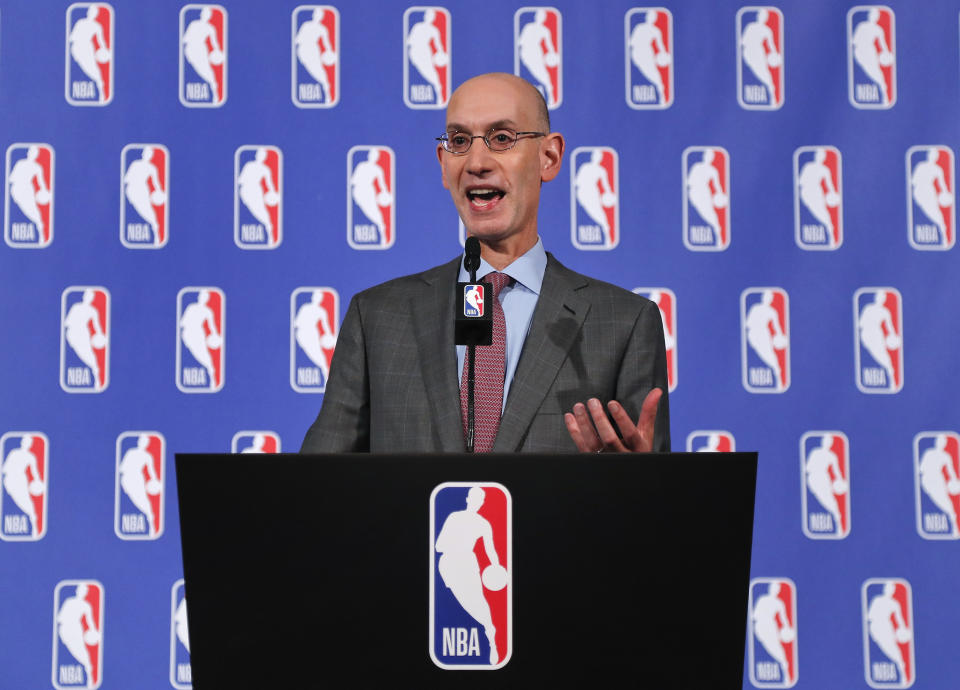How Adam Silver responds to possible player protests could be his defining moment
INDEPENDENCE, Ohio – LeBron James says he won’t kneel during the national anthem, J.R. Smith has yet to, and with the season set to begin Tuesday, the Cavaliers appear comfortable locking arms in a show of unity for social injustice and against the divisive rhetoric of the President of the United States.
One team down, NBA. Just 29 to go.
[Now’s the time to sign up for Fantasy Basketball! Join for free]
The NBA kicks off its 72nd season this week with a PR hand grenade rolling around in it. It’s been three weeks since Donald Trump began his assault on NFL players protesting during the anthem, igniting a racially charged debate that stretched from the Sunday morning news shows to Sunday Night Football. It has pit a league of predominantly black players (almost 70 percent, per recent estimates) against a largely white fan base (83 percent, according to a recent study), with a collection of rich, white owners standing in the middle.
NBA players have lashed out at Trump, too, though to this point they have taken it no further. James says his voice is more powerful than his knee, and others seem to agree with him. There is a heightened visibility that comes with being an NBA star, a megaphone not afforded most in other sports.

But what happens if someone kneels? “I suspect someone would,” Smith said recently. The NBA’s position is clear — players must stand. It’s a rule, one commissioner Adam Silver reminded reporters of at the league’s Board of Governor’s meeting last month, and reiterated in a memo to all 30 teams days later.
Would the league take action if a player broke it? Trump will. The president will fire off a 140-character critique before the final buzzer. Protests during the anthem are red meat to Trump’s base, a shiny object to distract from more pressing problems. He seemed to enjoy stirring the NFL pot — why wouldn’t he get a charge out of disrupting the NBA?
Silver had a chance to offer a progressive position on anthem protests weeks ago, and he blew it. He declared that he expected players to stand for the anthem, effectively, even if unintentionally, drawing a line in the sand in doing it. Who knows if this is Silver’s position or that of the predominantly white owners he works for? Several current and former high-ranking league and team officials told The Vertical they believe it’s the latter — but the message was clear, and the fallout swift. He was lampooned on “SNL” and saw his reputation erode among the rank-and-file.
“I don’t think [Silver] had to make it so public,” Wizards All-Star guard John Wall told The Vertical. “Because now, basically, you are telling grown men that they can’t do something. Grown men have their own opinion on whatever they want to do.”
Make no mistake: A player kneels, and it’s armageddon. Trump tweets, the league responds and suddenly Jake Tapper is moderating more NBA panel discussions than Ernie Johnson. A rule the NBA had previously shown little interest in enforcing — Smith said he has not been on the floor for the anthem for the last two and a half years, preferring to take the time to stretch in the back — suddenly becomes what divides it.
And really, if there were a league in a position to defy Trump, to back players, to test how many of its fans are offended and how many want to be offended, it’s the NBA. The league is 75 percent black. It has the highest share of black viewers — 45 percent — than any other sport. It has the only African-American owner (Michael Jordan) among the four majors. It scored an A rating from The Institute of Diversity and Ethics in Sport in June, which hailed the league as “the industry leader among men’s sports for racial and gender hiring practices.”

Besides, the league has navigated racially charged waters before. In 2014, dozens of players — including James — donned black T-shirts with “I CAN’T BREATHE” imprinted on them, a nod to the final words of Eric Garner, a black man killed during an arrest by New York police officers. It was a violation of the NBA’s uniform policy. Silver said he preferred players adhere to the policy — then did nothing when they didn’t. Within weeks, things were back to normal.
Granted, ’14 feels like a lifetime ago, politically. But it’s the kind of progressive position Silver has become known for. What would happen if, in response to a player kneeling, the NBA issued a terse, four-word statement: We support our players. What would happen if every owner did the same? What if the NBA denied this issue the oxygen it needs, if it didn’t get twisted in it in the same way the NFL has?
Perhaps it won’t. Say this, though — the league is likely relieved Kobe Bryant isn’t around. Bryant, in an interview with The Hollywood Reporter this month, said if he was still playing, he would kneel during the anthem. Imagine: Arguably the NBA’s most recognizable player on its marquee team in one of the league’s biggest markets taking a knee. The line between basketball and politics, blurred already, would disappear.
Will a player follow Bryant’s lead? Who knows, but the NBA needs to be prepared for it. How Silver responds will be a defining moment in his time as commissioner. The NFL was ham-handed in its handling of anthem protests. The NBA, if it comes to it, shouldn’t be.


